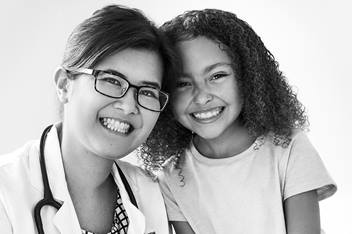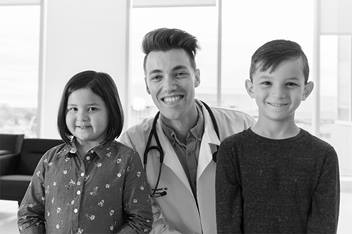Resident Experience
Residency training is fast-paced and challenging. The quest for excellence should not come at the expense of personal health and well being.
At Nationwide Children's Hospital, we care for, support and mentor our residents. One aspect of that support is a series of monthly and annual development and social events to help you balance your responsibilities, provide mechanisms for your feedback, and just have fun! Explore the program's clinical and non-clinical offerings, below.
Clinical Experiences
The diversity and volume of our patient population give you hands-on experience at every level and each rotation. Residents provide the front line of patient care under the watchful and respectful supervision of the faculty. Residents write 90 percent of inpatient orders at Nationwide Children's, and are relied on for their leadership, commitment and solid professional judgment. Administration and Board of Trustees recognize that residents are integral to all aspects of patient care. You are involved in decision-making at all levels and have ongoing, direct access to medical staff leadership, including the Chief Executive Officer.
Emergency Department
Pediatric residents spend one-to-two months each year in the Emergency Department. Emergency Services at Nationwide Children’s features a Level I Pediatric Trauma Center and Pediatric Emergency Department, which is staffed by board-certified/eligible pediatric emergency medicine subspecialists 24 hours a day.
Inpatient Teams
For decades, the Nationwide Children's Hospital pediatric residency program has organized the inpatient teams, floors and rotations based on the specialty of the patients' illnesses. Our inpatient ward teams are divided into Hospital Pediatrics (General Peds), Infectious Disease, Pulmonary, Renal/Endocrinology, Gastroenterology, Hematology/Oncology, Cardiology and Complex Care/Neurology. The advantages of having rotations focused on a specific specialty are many and include:
- The residents have the ability to immerse themselves into learning about a certain Pediatric specialty and focus rounds, inpatient and outpatient care, small group teaching and reading on that specific specialty during the rotation.
- Limits the number of faculty that residents need to consult to provide patient care. On many wards, a single attending is the only attending physician for all the patients on that team, which makes rounds, teaching and patient care family centered, efficient and focused.
- Exposes the residents to many different pediatric careers and sub-specialties early in their residency so they begin the process of deciding on their own specific career path. Build an effective patient care team. Since the care is specialty-based, nurses, respiratory therapists, case managers and other health care team members are all specialists in care of patients with related kinds of illnesses, which optimizes care for those patients.
- Nationwide Children's Hospital is a community hospital and the only hospital that admits children in the metropolitan area of almost two million people. Therefore, many of the patients admitted have common community illnesses such as bronchiolitis, dehydration, asthma, seizures, and infections.
- Even though many in-patient teams are specialty based, residents who are interested in primary care will be exposed to the common problems in those sub-specialties and can develop a deeper understanding of the management issues for patients with sub-specialty illnesses and learn more from the experts in their field.
The Pediatric Residency Training Program provides residents with well-rounded experiences in ambulatory pediatrics. Approximately 60% of each resident's total time is spent in an ambulatory setting. No matter what future career they may choose, our residents are prepared to be excellent "pediatric generalists."
During their three-year training program, they receive a minimum of 12 rotations of training devoted solely to ambulatory pediatrics. These experiences include required rotations in Primary Care Pediatrics, Adolescent Medicine, Developmental and Behavioral Pediatrics, Community Medicine and Pediatric Emergency Medicine. Additional ambulatory electives include Child Advocacy, Child Abuse, a range of International Health opportunities and an elective in a variety of Ambulatory Clinics.
Each resident is assigned to a specific practice in the hospital’s Primary Care Network (PCN) to learn how to provide a medical home for families. Faculty members, employed by the hospital, staff these PCN practices on the main hospital campus and in neighborhoods throughout Columbus. Most children in the PCN are from underserved populations, and many have complex medical needs.
Each resident spends one block at their PCN site every academic year, which will be augmented by other half day clinics throughout the year. During that block rotation, the resident takes calls for the Primary Care practice from home, with faculty members available for consultation. This way, each resident gains valuable experience in telephone medicine.
As Ohio’s capital and the 14th largest city in the United States, Columbus boasts a diverse population of many cultures and backgrounds. It is common for our residents to treat patients from developing countries, various ethnic groups and religious backgrounds, LGBTQIA+ families and provide care for patients who do not speak English.
Nationwide Children’s acknowledges and celebrates the diversity of the community we serve. In addition, the hospital is committed to providing a workplace where each person is respected and supported.
To provide a distinctive experience in community practice, each resident has an opportunity to go to a local community pediatrician’s office in their second and/or third year of residency. If interested, residents have the opportunity with our individualized curriculum to make the experience more longitudinal.
This vital, one-of-a-kind training experience:
- Reinforces the basics of primary care pediatrics
- Ensures a rich diversity of experience with different patient populations and a variety of private practices
- Teaches the business aspect of pediatric practice
- Provides the experience of working side-by-side with a private pediatrician
Resident Assistants are an integral part of some of our busiest inpatient services here at Nationwide Children's Hospital. They assume responsibility for a wide variety of non-clinical duties allowing residents to devote more time each day to education, teaching and patient care.
Our Resident Assistants round with the team each morning which helps ensure smooth and efficient information gathering, scheduling and discharge planning for our patients. They work with families to make sure they have all the follow up appointments and paperwork they need before they go home. Resident Assistants support the team each weekday by handling administrative tasks such as obtaining prior authorizations, lab results, making appointments and coordinating follow up care. They are an amazing and greatly valued resource to our residents.
More detailed information highlighting the benefits Resident Assistants add to residency training can be reviewed in this recent JGME publication.
Our Residents in Schools Initiative (RISI) is truly unique among traditional residency training programs. This initiative gives residents the chance to go to elementary schools and teach second- and third-grade students about health and science. While at their assigned school, residents teach students from a structured health curriculum designed to be fun, interactive and informative. The goals of the experience include:
- Educating children about their bodies and health and how to make safe and healthy choices
- Giving children, primarily from underserved neighborhoods, weekly role model experiences with young health care professionals, highlighting the value of education
- Providing opportunities for residents to engage with the children in our community outside of the clinical environment
- Showing residents the challenges of teaching and how children’s academic, social, emotional and behavioral issues impact their classroom experience
- Encouraging advocacy for children’s issues by residents and fostering the view that pediatricians are part of a bigger community
Non-Clinical Educational Experiences
Professional identity formation is a crucial component of any trainee’s experience, and we know every resident has individualized career aspirations. Luckily, at Nationwide Children’s learning happens in more places than just your clinical rotations. Through our program, residents are given the opportunity to have educational content delivered in a variety of locations including didactic lectures, simulations, advocacy days, advanced competencies, and yearly workshops.
Lectures
Nationwide Children's Hospital has a wide variety of lectures and training opportunities for our residents. View the Lecture Series Listings.
Evidence Based Medicine
Clinicians provide optimal care for their patients when they apply the highest quality, most current scientific evidence to each patient encounter. As such, our residents are trained in the application of evidence-based clinical practices. This training is formally conducted in various settings, including:
- Monthly EBM emails with quick learning points and a Board review question
- Presentation of an EBM project during the Adolescent Medicine rotation
- Use of EBM to present at noon report and at M&M
- An EBM workshop during one of our senior retreats
Importantly, our faculty emphasizes the use of EBM during rounds and in clinic, as EBM ultimately starts with the patient and ends with the patient. We focus on the five A’s of Evidence-Based Medicine: Assess the patient, Ask a well-built question derived from the case, Acquire high-quality evidence, Appraise the evidence and Apply it to the patient.
Residents as Teachers
The Residents as Teachers program is a longitudinal curriculum that includes presentations and workshops that focus on teaching topics and skills important to the needs of residents during each year of training.
The topics are presented at retreats and core lectures throughout residency. The teaching curriculum is focused in retreats to ensure all residents can experience them (since the entire class is made available for their retreats) and then discuss and practice these concepts with their peers.
|
Topic |
Retreat |
|
The role of the Resident as Teacher (Introduction) |
PL-1 Orientation |
|
Teaching adults: understanding teaching and learning styles |
PL-1 Orientation |
|
Microteaching |
PL-1 Feb |
|
Providing effective feedback |
PL-1 Feb |
|
Learning climate/approach, goal setting |
PL-1 May |
|
Dealing with the struggling learner |
PL-1 May |
|
Effective large group presentations |
PL-2 Feb |
|
Interactive learning methods |
PL-2 Feb |
All residents participate in competency assessments in our Clinical Skill Center and maintain a computerized procedure log. Required courses are:
- Advanced Cardiac Life Support
- BLS
- Pediatrics Advanced Life Support
- Neonatal Resuscitation
Workshops and retreats are held for resident classes during specific times of residency training to focus that group of residents on topics that are pertinent to their education at that time, and to allow the residents to connect as a class. Current retreats/workshops include:
- Orientation — Orientation helps first-year residents' transition smoothly from medical school to the hands-on training of residency. Residents learn about the hospital system and what is expected of a first-year resident. Residents participate in team-building activities and a skills assessment session during orientation along with completing certification courses in PALS and NRP.
- PL-1 Retreat — In late winter, a two-day overnight retreat is held off-site for first-year residents. This retreat focuses on stress reduction, team building and covers a variety of topics including personality types, teaching skills, communication skills and professionalism.
- PL-1 Supervisory Workshop — In late spring, a two-day workshop for first-year residents focuses on the upcoming challenges of being a supervisory resident, teacher and team leader. Residents also receive a ‘QI Education Overview’ to help prepare them to select their QI Project during their second year to select their QI project during their second year.
- PL-2 Workshop — In the winter, a one-day workshop incorporating teaching techniques and a variety of specialized programs to enhance your training.
- PL-3 Workshop — In the fall, a one-day workshop for third-year residents focuses on information needed to transition into medical careers after residency. Discussions include information about licensure and credentialing, CME, billing and coding, and managed care.
How does the residency program learn about resident interests, needs and concerns?
- House Staff Advisory Committee (HSAC) – An advisory board to the program director, this committee is composed of residents from each class, elected each year by their peers. The HSAC represents the overall views of the residents and discusses issues that affect them in monthly meetings.
- House Staff Business Meeting – On scheduled days, residents gather for a one-hour business meeting chaired by the chief residents. This informal meeting is used to pass along a variety of information, including upcoming events, guest speakers, curriculum changes, job opportunities and social events.
- Program Director Forum – A monthly open forum with our program director team so we can discuss important issues and hear about your concerns.
- Fellow and Resident Advisory Council (FRAC) – Serves a crucial role in communication among residents, fellows, and institutional leaders. FRAC collaborates with leaders throughout Nationwide Children's Hospital to enhance patient care, education, research, and advocacy.
Nationwide Children’s is home to one of the nation’s ten largest free-standing pediatric research facilities, providing abundant optional research opportunities for residents. Nearly a third of our residents participate in bench and/or clinical research projects under the direction of faculty members eager to have resident involvement. Each June, The Abigail Wexner Research Institute highlights resident, fellow and student research during a two-day Research Forum.
- All residents participate in a two-week immersive advocacy and community health rotation during their intern year. The goal of this rotation is to provide a wide range of experiences so residents can develop as advocates for children within their institution, locally or at the state or federal level.
- Residents influence the public (and legislators) through well-crafted letters to the editor of the local newspaper.
- Residents with a strong interest in advocacy can complete an additional four-week Child Advocacy Elective, where they explore in-depth a topic of their choice with a focus on advocacy or community health.
- Residents can also enroll in the longitudinal Advocacy Advanced Competency where they hone their skills as child health advocates through evening sessions, retreats and hands-on mentorship as they work through an advocacy project. Past residents have focused on issues such as refugee health disparities, food insecurity, adolescent transitions, gun violence prevention and youth who are homeless.
- Pediatric Residents Annual Statehouse Day: Residents from across Ohio join to raise their voices at Ohio’s Capitol through small group legislative visits, hearing from policy speakers, and sharing their advocacy experiences.
Resident Success Fueled by Mentorship
Entering into residency, many residents have different interests, career aspirations, and post-residency plans. At Nationwide Children’s we provide mentorship in a few different forms to allow you access to all that our institution has to offer. Our goal is to link pediatric residents early in their training to faculty who can provide personal/emotional support, career guidance, and information about effective local resources.
Butterfly Buddies: Our residents understand the feelings of post-match day excitement. Due to this, our program will assign you a butterfly buddy, who is a current resident, who will be your first point of contact. Their role is to help alleviate any stressors prior to your transition to the city or into the program!
APD Mentorship: We are lucky enough to have program leadership from multiple career, lifestyle, and educational backgrounds. After Match Day, we determine where your initial career interests may lie and assign you with an APD who is most closely aligned with that career.
Faculty Database: Although career mentorship is often sought after, many of our faculty also offer mentorship in topics outside of the clinical realm and this database keeps residents up to date on faculty who are available for these topics.
Organic Mentorship: Many residents find a mentor in a more natural circumstance. Rotating through multiple services and subspecialties allows face time with faculty that may line up with some of your interests, allowing a natural mentoring relationship to blossom.
Resident interests and focus can (and should) change throughout residency. As residents progress and identify specific areas of interest, the hope is that the faculty mentors can help connect them with faculty in those fields to support those interests.
Interns complete a six-session series of simulations aimed at managing acute patient deterioration at our state-of-the-art Simulation Center. Located across the street from the main hospital, the Sim Center features simulation spaces that mimic in-patient and out-patient rooms, as well as critical care rooms. Additionally, residents complete in-situ mock codes throughout their residency training.
Evaluations are essential feedback during your residency. Your performance is evaluated monthly by attending physicians, primary care and emergency department faculty, elective preceptors, medical students and peers. Twice a year, you will meet one-on-one with a program director to review your progress. During this time, your program director will assist you with your decision regarding your rotation selection for the upcoming academic year, as well as discuss and support your future career plans.



